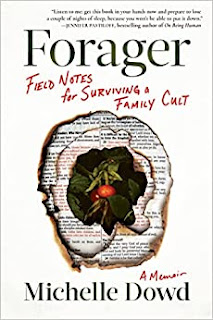Guest review by: Becki Bayley
Today is shopping day. When Mrs. Washington arrives home, her three sons run out to help carry the bags. The oldest reaches in and opens a box of cereal, which he begins consuming with one hand while holding a bag under his armpit and another bag with his other hand. Mrs. Washington doesn’t scold him for this. She just laughs.
I’m not sure whether she would care about my hunger if she knew, but she doesn’t seem to even notice I am there. I’m sure I can wrangle some leftovers when they’re through. I hold open the door, careful not to let the dog out, while the boys go back for more bags.
Heartbreaking to imagine the author’s upbringing, and know it still happens, because there are still adults that share her parents’ beliefs and enforce them with their parental authority.
Official synopsis:
At the Field, a young Michelle lives a life of abuse, poverty, and isolation, as she obeys her family’s rigorous religious and patriarchal rules—which are so extreme that Michelle is convinced her mother would sacrifice her, like Abraham and Isaac, if instructed by God. She often wears the same clothes for months at a time; she is often ill and always hungry for both love and food. She is taught not to trust Outsiders, and especially not Quitters, nor her own body and its warnings.
But as Michelle gets older, she realizes she has the strength to break free. Focus on what will sustain, not satiate you, she tells herself. Use everything. Waste nothing. Get to know the intricacies of the land, like the intricacies of your body. And so she does.
Using stories of individual edible plants and their uses to anchor each chapter, Forager is both a searing coming-of-age story and a meditation on the ways in which understanding nature can lead to freedom, even joy.
Oh, dear Michelle. The whole story is of a child, and how she is essentially raising herself. She mentions near the beginning that her mother is still alive, and does not want her to speak badly of the family and their religious upbringing. The author is true to her word, and does not intentionally speak poorly of her upbringing, but the straightforward presentation of her circumstances is hard to misunderstand.
Each chapter also opened with field notes of what she had learned of the plants around her as she grew up at the Field, a religious compound. She grew up expecting the end of the world to come soon, and her mother taught her how to survive in the end days. The field notes gave identifying details of plants, and how to harvest each one for any available nutrients, while hopefully not injuring or poisoning the one who needed it.
Luckily, her family did not completely shun the outside world and medical assistance, and the author got a temporary reprieve from all responsibility for herself when confronted with a medical condition as a child. Living with her grandma between hospital stays allowed her to see a little more of the outside world than her siblings, but also probably kept her from developing some of the same relationships within the cult that the rest of its members appreciated.
The insights and anecdotes of the author were so interesting. The book was definitely 3 out of 5 stars, and the author obviously gained a lot from her secretive reading to expand her vocabulary and knowledge of life on the outside. Her story could be recommended to those who like stories of children overcoming adversity, and it would be interesting if she told more about how her upbringing influenced her own adult life outside the Field.
{click here to purchase}
Becki Bayley is a wife and mother. When the kids are grown, who knows who she’ll be? You can follow along at her blog, SweetlyBSquared.com
Forager: Field Notes for Surviving a Family Cult: a Memoir, by Michelle Dowd















0 comments:
Post a Comment